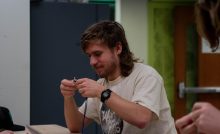‘How to Grow Your Green Lab’: Pitt’s detailed approach to sustainability


A screenshot of the Lunch & Learn: How to Grow Your Green Lab event.
The University of Pittsburgh Office of Sustainability hosted a Zoom webinar on Wednesday afternoon titled “How to Grow Your Green Lab.” The meeting aimed to inform Pitt students, faculty and staff about the Pitt Sustainability Plan, a report of the sustainability-related goals the University is working toward on Pitt’s campus. The sustainability plan identifies a variety of target areas, such as energy and emissions or food systems. The end of the meeting, targeted towards faculty and staff, instructed sustainable and environmentally-friendly office and lab practices. Emily Potoczny, Pitt’s sustainability engagement manager, led the presentation.
“We are in a climate emergency. Our mission, our community and our world are at risk,” Potoczny said.
The Office of Sustainability emphasizes that sustainability is an important issue across Pitt’s Oakland community. Pitt has 72 offices, 43 labs, 39 ambassadors and over 1,000 faculty involved in their green initiative, designating spaces that are committed to operating sustainably. Potoczny said in her presentation that labs and medical buildings average the highest energy usage of all buildings on campus, so Pitt is heavily focused on making these spaces more sustainable. Pitt also has 17 LEED-certified buildings. LEED certification is a globally recognized rating system for sustainability in building construction, operation and design. In addition, three more LEED-certified buildings will be added to Pitt’s campus — the new Arena and Sports Performance Center, Recreation and Wellness Center and the renovated Hillman Library.
The Pitt Sustainability Plan has three primary areas of focus — stewardship, exploration and community & culture. Stewardship deals with resource management and individual impact on the environment. These goals encompass factors like transportation, water systems and emissions. Exploration focuses on goals like research and global outreach while emphasizing environmental social engagement and education. Finally, the community & culture aspect of the plan represents the different communities in the world, like Pitt’s campus in Oakland. City connections, access to food and public health are all sustainability-focused areas that impact people’s daily lives.
Potoczny said these efforts aim to “weave a culture of sustainability into the everyday fabric of our campus & community.” She mentioned the sustainability culture survey, a poll of faculty, staff undergraduate and graduate students done by Pitt every three years. Over 90% of the Pitt community reported sustainability as a “moderately important issue,” with over 75% designating it as an “extremely important issue.” Some of the top issues of concern among the polled community include climate change, recycling, energy efficiency and health and overall well-being. Among undergraduate students, the most pressing issues in sustainability are climate change, reducing emissions, reducing fossil fuel dependency, recycling, composting and material diversion from landfills.
Potoczny listed many ways individuals, especially students, can contribute to sustainability on Pitt’s campus. Recycle, compost and avoid single-use items in order to decrease the amount of material waste produced. Using alternate forms of transportation, like walking, the bus or the POGOH electric bikes around Pittsburgh, helps cut down on emissions and energy use. Unplugging unnecessary devices and turning off lights when not in use will reduce the amount of energy wasted.
These solutions pave the pathway to carbon neutrality, the goal of net zero emissions. As part of Pitt’s Climate Action plan, released in 2022, the University aims to reduce greenhouse gas emissions by 50% by 2030 and to be completely carbon neutral by 2037. According to the action plan, carbon neutrality occurs when the amounts of carbon emitted and removed in the atmosphere are equal. The Climate Action Plan aims to reduce energy demand, lower carbon connections and provide a clean energy supply along the path to neutrality.
In addition to LEED-certified buildings, Pitt has other sustainable practices in place for buildings on campus. As part of Pitt’s Green Engagement Programs, labs, offices and floors are able to be designated as “green spaces,” signifying them as sustainably-operated places. Residents and student organizations are able to be designated as “green” by completing a self-assessment of their daily sustainable practices. The University also puts on an end-of-year sustainability sale called Pitt Clean and Swap, where faculty and staff are able to exchange different types of office equipment and other reusable classroom materials. The remaining materials at the end of the sale are donated to nonprofit education organizations within the City of Pittsburgh.
Pitt Sustainability has various other environmental resources available on its website. The webpage features information about Pitt’s sustainability practices with waste disposal, health and wellness, food and dining and diversity, equity and inclusion.
Recent Posts
SGB introduces new governing code bill and addresses rumors of ICE on campus
At its weekly meeting at Nordy’s Place on Tuesday, Student Government Board introduced an omnibus…
Opinion | School should be in the summer
Although this may be controversial, I believe that from this data, it is evident that…
Weathering the storm: Pittsburgh teams have tackled some of the toughest environments
The end of the year in western Pennsylvania is always marked by two things —…
Notes From an Average Girl // Notes on Book Banning
In this edition of Notes From an Average Girl, senior staff writer Madeline Milchman writes…
To Be Honest // Yup, it is that damn phone
In this edition of To Be Honest, staff writer Evin Verbrugge writes about her phone…
Meaning at the Movies | Portraying Toxic ‘Adolescence’
In this edition of Meaning at the Movies, staff writer Lauren Deaton explores the mini-series…


